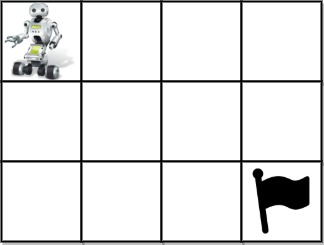LeetCode 솔루션 분류
[12/31] 980. Unique Paths III
본문
You are given an m x n integer array grid where grid[i][j] could be:
1representing the starting square. There is exactly one starting square.2representing the ending square. There is exactly one ending square.0representing empty squares we can walk over.-1representing obstacles that we cannot walk over.
Return the number of 4-directional walks from the starting square to the ending square, that walk over every non-obstacle square exactly once.
Example 1:

Input: grid = [[1,0,0,0],[0,0,0,0],[0,0,2,-1]] Output: 2 Explanation: We have the following two paths: 1. (0,0),(0,1),(0,2),(0,3),(1,3),(1,2),(1,1),(1,0),(2,0),(2,1),(2,2) 2. (0,0),(1,0),(2,0),(2,1),(1,1),(0,1),(0,2),(0,3),(1,3),(1,2),(2,2)
Example 2:

Input: grid = [[1,0,0,0],[0,0,0,0],[0,0,0,2]] Output: 4 Explanation: We have the following four paths: 1. (0,0),(0,1),(0,2),(0,3),(1,3),(1,2),(1,1),(1,0),(2,0),(2,1),(2,2),(2,3) 2. (0,0),(0,1),(1,1),(1,0),(2,0),(2,1),(2,2),(1,2),(0,2),(0,3),(1,3),(2,3) 3. (0,0),(1,0),(2,0),(2,1),(2,2),(1,2),(1,1),(0,1),(0,2),(0,3),(1,3),(2,3) 4. (0,0),(1,0),(2,0),(2,1),(1,1),(0,1),(0,2),(0,3),(1,3),(1,2),(2,2),(2,3)
Example 3:

Input: grid = [[0,1],[2,0]] Output: 0 Explanation: There is no path that walks over every empty square exactly once. Note that the starting and ending square can be anywhere in the grid.
Constraints:
m == grid.lengthn == grid[i].length1 <= m, n <= 201 <= m * n <= 20-1 <= grid[i][j] <= 2- There is exactly one starting cell and one ending cell.
Accepted
163.4K
Submissions
200K
Acceptance Rate
81.7%
관련자료
-
링크
댓글 1
학부유학생님의 댓글
- 익명
- 작성일
class Solution:
def uniquePathsIII(self, grid: List[List[int]]) -> int:
ROW, COL = len(grid), len(grid[0])
path = set()
start = (0,0)
goal = (0,0)
obstacles = 0
for row in range(ROW):
for col in range(COL):
if grid[row][col] == 2:
goal = (row, col)
elif grid[row][col] == -1:
obstacles += 1
elif grid[row][col] == 1:
start = (row, col)
res = 0
directions = [(0,1),(1,0),(-1,0),(0,-1)]
def dfs(r, c):
path.add((r,c))
if len(path) == ROW*COL - obstacles and (r,c) == goal:
nonlocal res
res += 1
else:
for rd, cd in directions:
nr, nc = r+rd, c+cd
if 0<=nr<ROW and 0<=nc<COL and grid[nr][nc] != -1 and (nr, nc) not in path:
dfs(nr, nc)
path.remove((r,c))
dfs(start[0], start[1])
return res









